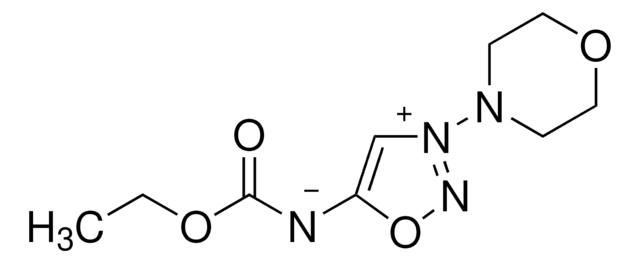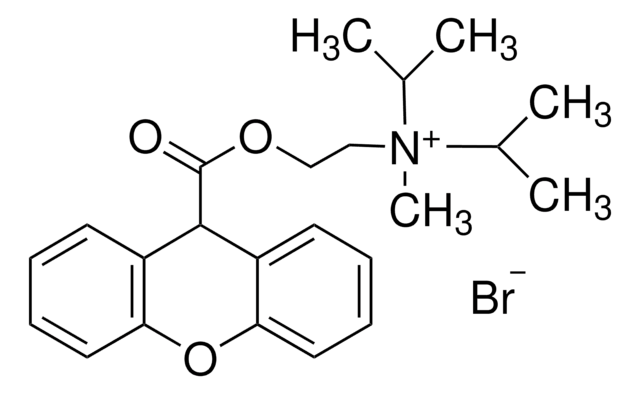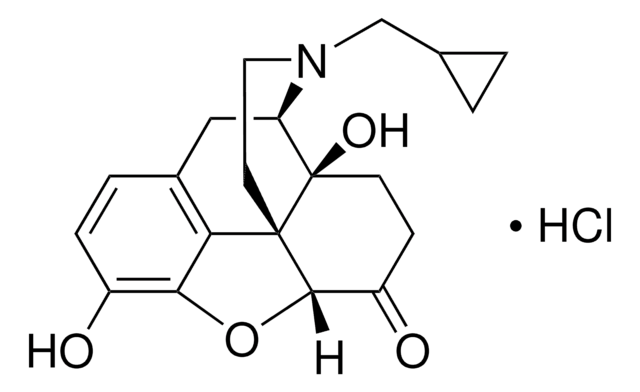M2901
Molsidomine
Synonym(s):
N-(Ethoxycarbonyl)-3-(4-morpholino)sydnone imine, SIN-10
Sign Into View Organizational & Contract Pricing
All Photos(3)
About This Item
Empirical Formula (Hill Notation):
C9H14N4O4
CAS Number:
Molecular Weight:
242.23
EC Number:
MDL number:
UNSPSC Code:
12352200
PubChem Substance ID:
NACRES:
NA.77
Recommended Products
storage temp.
2-8°C
SMILES string
CCOC(=O)N=C1O[N-][N+](=C1)N2CCOCC2
InChI
1S/C9H14N4O4/c1-2-16-9(14)10-8-7-13(11-17-8)12-3-5-15-6-4-12/h7H,2-6H2,1H3/b10-8-
InChI key
XLFWDASMENKTKL-NTMALXAHSA-N
Looking for similar products? Visit Product Comparison Guide
Application
Molsidomine has been used as nitric oxide (NO)-releasing vasodilator to study the effect of NO on angiostatin production in aging rat kidneys.
Biochem/physiol Actions
Molsidomine is an effective vasodilator and a long-lasting nitric oxide (NO) donor. It is a pro-drug that is enzymatically decarboxylated to form 3-morpholinosydnone imine (SIN-1) in the liver. Molsidomine is used as an anti-anginal agent and possesses antioxidant properties. It may be used to treat cisplatin-induced oxidative stress in the liver tissue. Molsidomine has also been used during angina pectoris, heart failure, and after myocardial infarction.
Orally active, long acting vasodilator; antianginal; converted by the liver to the active metabolite, SIN-1
Certificates of Analysis (COA)
Search for Certificates of Analysis (COA) by entering the products Lot/Batch Number. Lot and Batch Numbers can be found on a product’s label following the words ‘Lot’ or ‘Batch’.
Already Own This Product?
Find documentation for the products that you have recently purchased in the Document Library.
R E Nitz et al.
Pharmacotherapy, 7(1), 28-37 (1987-01-01)
The long-acting antianginal drug molsidomine has been shown experimentally to reduce myocardial infarct size when administered prior to or after cardiac insult. This is due to several drug actions. Dilation of postcapillary capacitance vessels diminishes venous return, preload, heart dimensions
Roberta Buono et al.
Stem cells (Dayton, Ohio), 30(2), 197-209 (2011-11-16)
Satellite cells are myogenic precursors that proliferate, activate, and differentiate on muscle injury to sustain the regenerative capacity of adult skeletal muscle; in this process, they self-renew through the return to quiescence of the cycling progeny. This mechanism, while efficient
Istvan Kovanecz et al.
The journal of sexual medicine, 9(11), 2814-2826 (2012-09-15)
Long-term daily administration of phosphodiesterase type 5 (PDE5) inhibitors in the rat prevents or reverses corporal veno-occlusive dysfunction (CVOD) and smooth muscle cell (CSMC) loss and fibrosis, in both aging and bilateral cavernosal nerve resection (BCNR) models for erectile dysfunction.
Jerzy Sacha et al.
Annals of noninvasive electrocardiology : the official journal of the International Society for Holter and Noninvasive Electrocardiology, Inc, 17(3), 286-290 (2012-07-24)
Myocardial ischemia during coronary spasm may generate malignant ventricular arrhythmias. The J-wave pattern was suggested to be a marker of a disorder associated with life-threatening arrhythmias. We report the case of a patient with vasospastic angina and J-wave pattern in
Molsidomine
Meyler's Side Effects of Drugs: The International Encyclopedia of Adverse Drug Reactions and Interactions (2016)
Our team of scientists has experience in all areas of research including Life Science, Material Science, Chemical Synthesis, Chromatography, Analytical and many others.
Contact Technical Service









